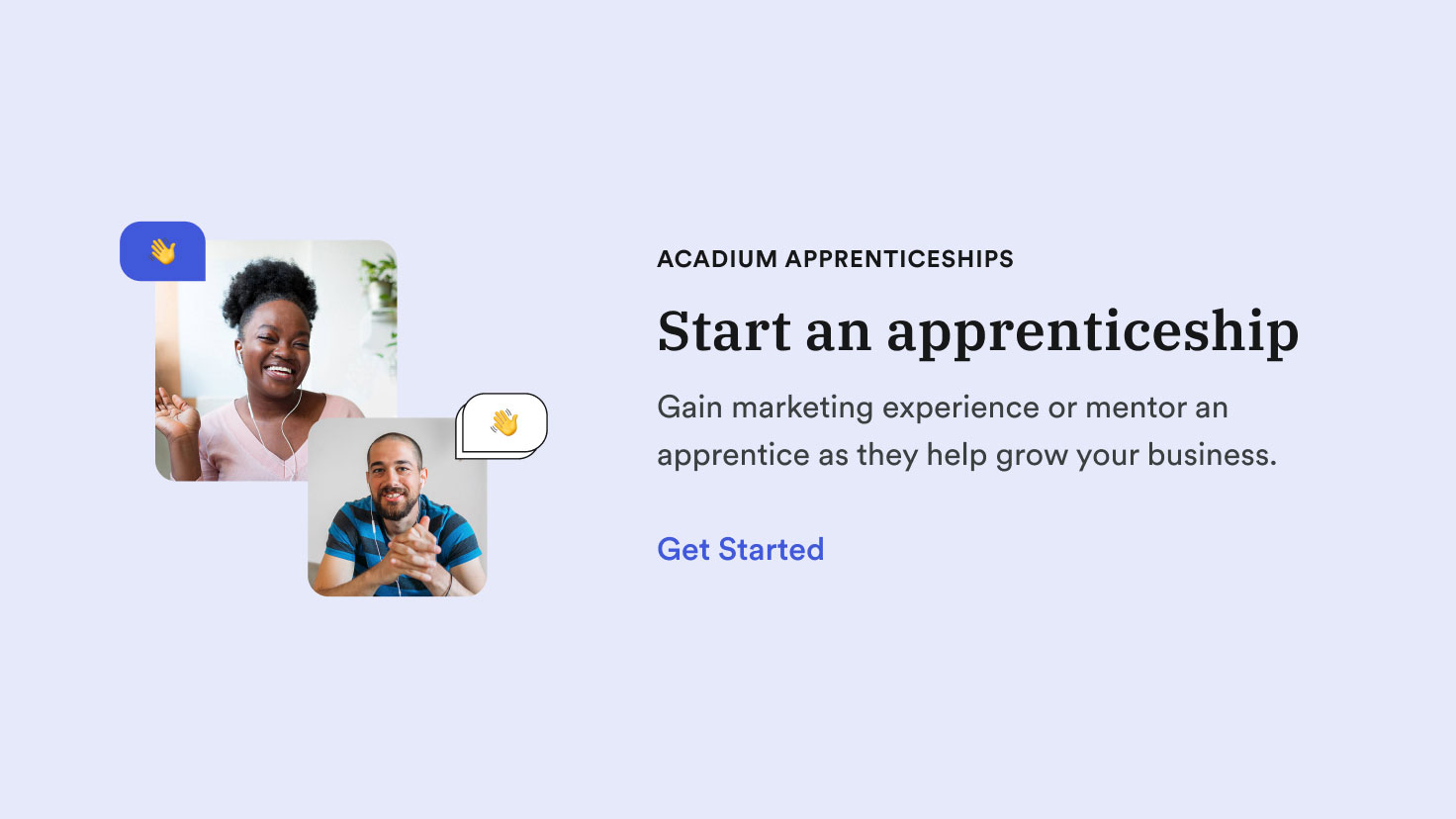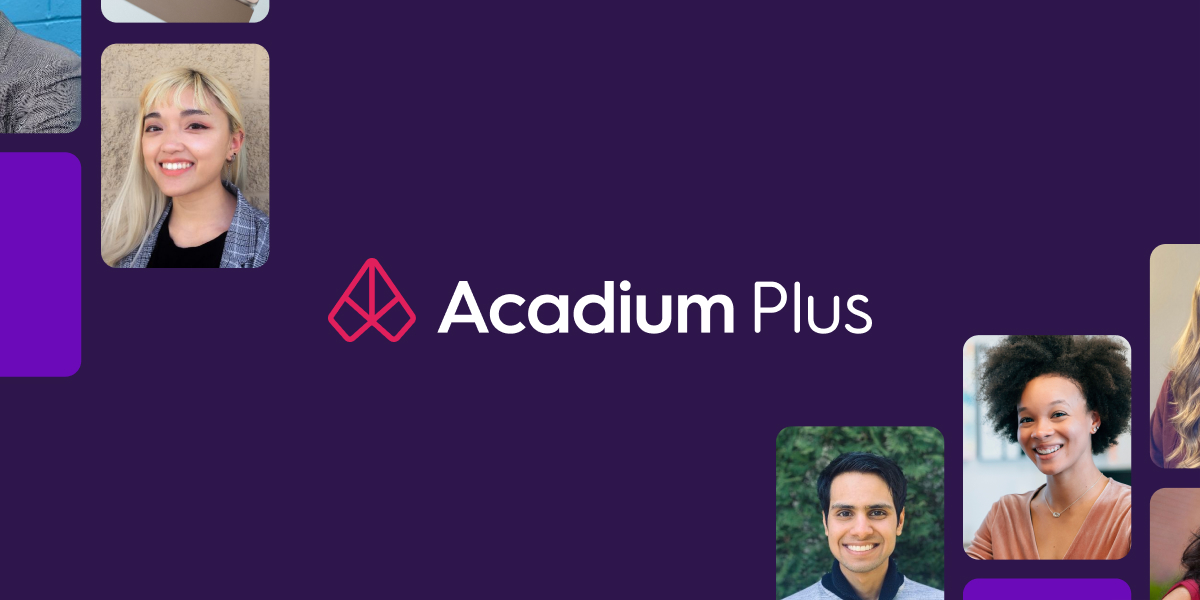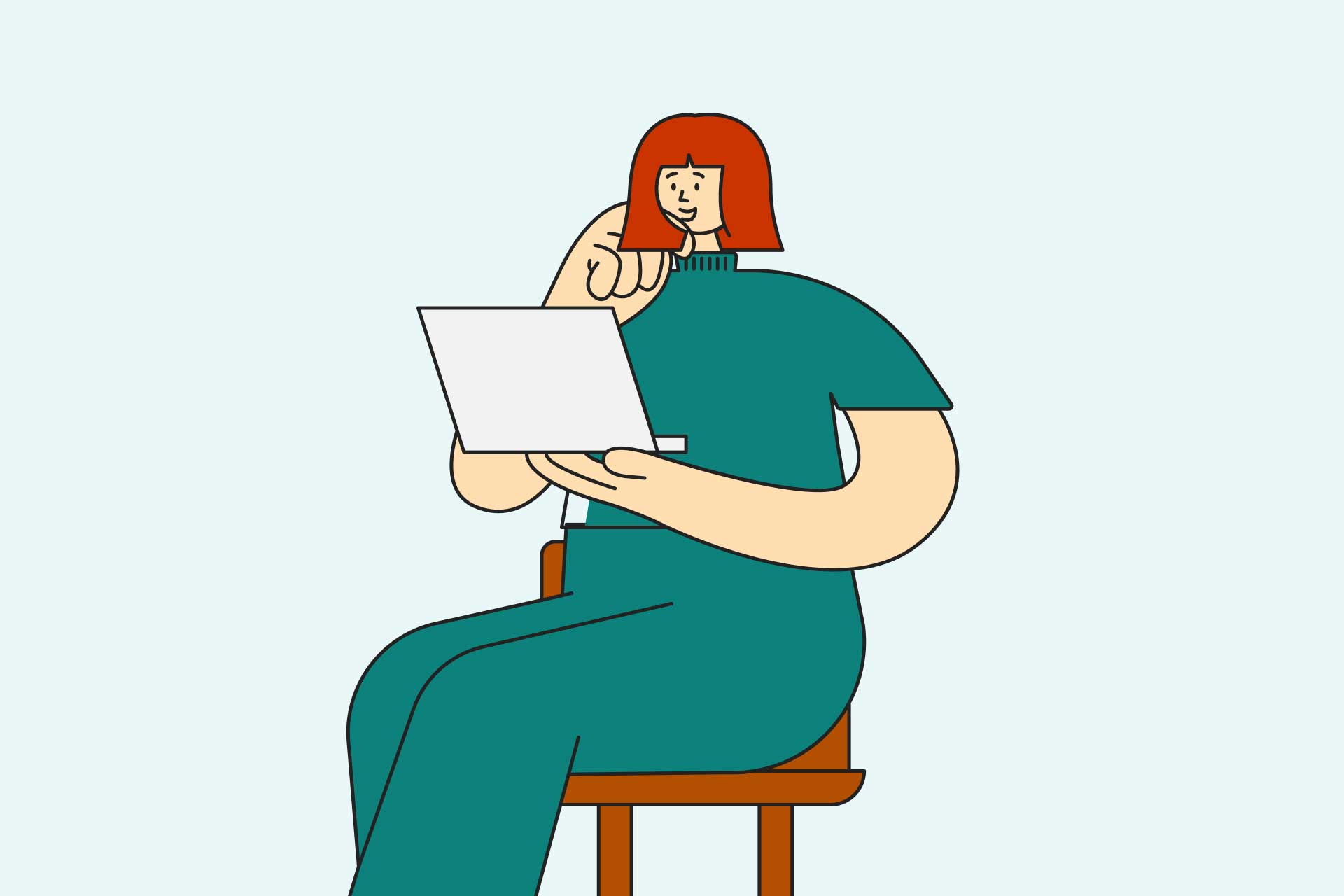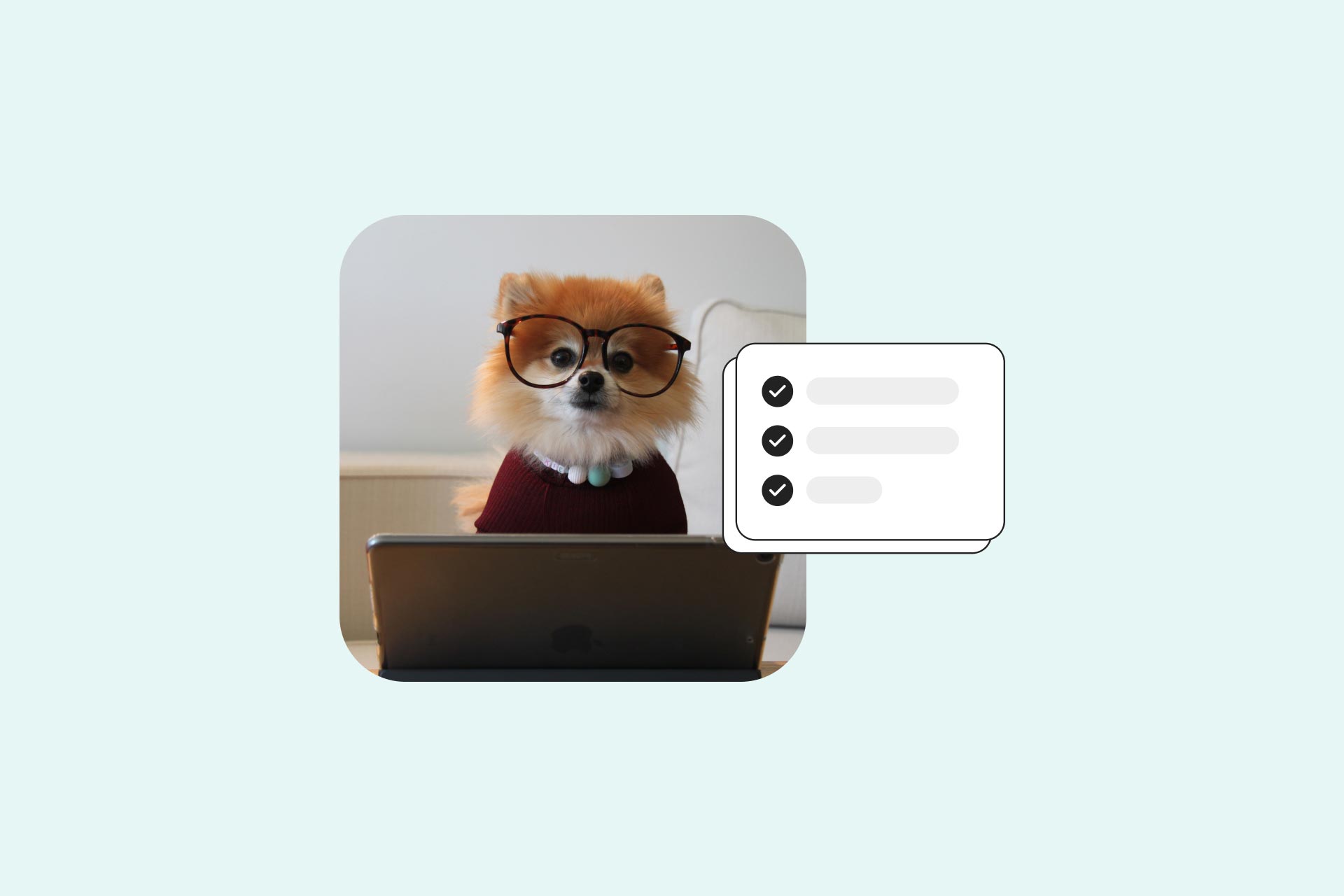Ace that Marketing Job Interview!
Got a marketing job interview? Awesome, you're one step closer to that marketing job you want! Here's our best advice on how to ace that interview, including what marketing-focused interview questions to prepare for.

You want it, but when you do get it, you go into a tailspin. So much rests on this one event. I’m talking about the marketing job interview.
The job interview is probably the scariest part of the job hunt. The stakes are high. Will you move on to the next step in the recruitment process? Will you get the coveted job offer? It all depends on how well you perform at the interview.
And you never really know what to expect. Will the interviewer be nice? Will they ask weird questions?
If you’re applying for a marketing position, you know the interviewer will ask about results. But what if you’re just getting started? What if you’re right out of college or have never had a marketing job before?

Leverage marketing apprenticeships during job interviews.
In this post, we’ll help you ace your next marketing job interview. You’ll see that no matter where you are in your marketing career, you can take steps to shine at job interviews.
How do I prepare for a marketing job interview?
“Good fortune often happens when opportunity meets with preparation.” – Thomas A. Edison
The way to make a job interview “easier” is through preparation, preparation, preparation!
Preparing for a job interview takes place on three levels: your mindset; your answers, and yourself.
1. Prepare your mindset
Your self-esteem can take a beating when you’re looking for a job. Submitting dozens—even hundreds—of applications and getting rejections or not hearing at all from potential employers can leave you feeling unwanted and discouraged.
And that’s exactly the opposite of the attitude you need to do well in a job interview. You need to be confident and composed. You need to have 100% certainty that you’ll make a valuable addition to the organization you’re applying to.
You’ve heard the advice that you shouldn’t come across as desperate, right? How do you avoid that if that’s just what you’re feeling?
Strangely enough, the very act of putting together a tailored resume for each job application can help build your confidence.
That’s what I learned when I was laid off two times in a span of nine months. I spent hours customizing resumes for various positions. This exercise forced me to reflect on what I accomplished for each of my previous employers and clients.
As a result, I not only had a long list of accomplishments. I also had an unshakeable confidence in what I’m capable of and what I can contribute to any employer smart enough to hire me.
When the dust settled, out of every 10 jobs I applied to, I was rejected 9 times! (I know because I tracked my job search on a spreadsheet). Sure, I was disappointed especially with jobs I thought would’ve been perfect for me.
But I wasn’t crushed. I didn’t cry in the shower, or stay awake wondering what I’d done wrong. Instead, every time I got a “no” or no response at all, I thought, “Thank you for not wasting my time,” and I moved on.
And so, if you’re feeling at all unsure of your capabilities, go ahead and do this simple exercise: Sit down for at least 10 minutes and make an inventory of all your strengths, skills, assets, and accomplishments. Really feel proud of yourself as you write each item on the list. Go slowly. Revel in the feelings of achievement and satisfaction.
Dig deep. Think back to your childhood, extracurricular activities at school, volunteer work. Heck, if you organized a complicated family vacation that everyone ended up enjoying, you should include that on your list, too. No achievement is too big or too small.
Now you not only have a stockpile of assets you can potentially mention during an interview. You also have a feel-good list you can keep going back to when your ego has taken a beating and you’re feeling deflated. Go over the list right before your marketing job interview and you’ll enter that conversation beaming with confidence.

Prepare yourself mentally and emotionally for a marketing job interview. (Photo by George Milton)
2. Prepare your answers
The other kind of preparation you need to do is to prepare your answers to the interview questions.
To help you do this, you have to first anticipate what questions the interviewer may ask you. Second, you have to figure out how to frame your answers in a way that best aligns with the needs and culture of the employer.
To help you do all that, it pays to research the company. Know what they do, who their market is, and what they value.
You also have to truly understand the job description. Go over the job description picking up on important keywords, tasks, and expectations. Make sure you understand what the employer wants to achieve through the position.
Armed with a deep understanding of the position and the company, you can proceed to prepare your answers to the questions they may ask during the interview. There are at least two frameworks you can use to prepare your answers:
STAR Method
The STAR Method is a popular framework for answering interview questions. It helps you keep your thoughts organized. By ending on results, it makes your answer credible. And of course, results make you look good.
STAR stands for:
- Situation – the context or background
- Task – your challenge or responsibility in the situation
- Action – the exact activities or steps you took
- Result – the outcomes achieved through your actions
The STAR method is particularly useful for answering behavioral questions, like “Tell me about a time when you had to work under extreme pressure.” It’s also a good way to structure your answers to questions you weren’t prepared for.
Key Experiences Method
I learned this method from the book, Persuasion Skills Black Book of Job Hunting Techniques: Using NLP and Hypnotic Language Patterns to Get the Job You Deserve, by Rintu Basu.
The general idea is to pick five key achievements from your resume or CV, and use them to answer most of the interview questions. Having these pieces of evidence makes you a more credible candidate because you’ll be backing up your answers with concrete achievements and examples. And even if you’re applying for a marketing position, not every key experience has to be specifically about marketing.
“You can use almost any experience to come up with a great interview answer,” Basu writes. But of course, this method works best if you choose the most impressive achievements that are relevant to the role you’re applying for, including those that are transferable to marketing.
Like the STAR Method, Basu’s method also follows a formula:
- Acknowledgement. Acknowledge the question by repeating key phrases from it and then building your answer from there.
- Segue. This is a phrase or sentence that smoothly transitions to the key experience you want to highlight.
- Evidence. Describe one key experience or achievement you want to use as a piece of evidence or example to answer the question. You can use the STAR Method for this part of your answer.
- Benefit. End your answer by spelling out how the experience will benefit the employer.
The best way to explain this formula is by example.
Let’s say one key experience I want to use is how I tripled a website’s traffic in my first three months on the job, without publishing more blog posts. I can use the formula above to answer different interview questions.
Question: “Tell me about yourself.”
Answer:
“One thing I can tell you about myself is that I love to get results.”
[I’m acknowledging by repeating words from the question.]
“For example, in my current role as content manager, I was able to triple the organic traffic to the blog in just three months.”
[The phrase, “for example” acts as a segue to my experience.]
“I accomplished that by publishing fewer posts and focusing on SEO and promotion. The increased traffic also resulted in an increase in applications, which is the ultimate goal for the content.”
[I talk about the experience briefly and in a way that’s relevant to the role I’m applying for.]
“What this means for you is that, when working for you, I will apply the same skills and drive for results to achieve the company’s goals.”
[I spell out the benefits for the employer.]
By following this formula, I could use the same experience to answer other interview questions, just by changing the first part of my answer. To illustrate:
Question: “What skills do you bring to the job?”
“I bring many skills to the job. One of them is the ability to drive organic traffic to a website. In my previous role, I was able to triple the organic traffic to the blog in just three months ….”
Question: “Give me an example of your content marketing skills.”
“One example of my content marketing skills is when I tripled the organic traffic to the blog in just three months….”
See how that works?
“If you have five pieces of evidence [or achievements] you can cover several hours of the most exacting interviews,” Basu claims.
3. Prepare yourself
It’s all well and good to prepare your mindset and your interview answers. But you still need to prepare yourself for the actual interview. And that means practice!
Practice smiling and opening the interview with small talk. And practice saying your answers out loud.
Ideally, you can recruit a friend or family member to act as the interviewer. This is especially powerful if they can give you constructive feedback after the mock interview.
At the very least, you can sit in front of the mirror and practice giving your answers.
You could even do a Zoom interview by yourself and record the session. That way, you can watch the recording and see for yourself how you come across on a video call. You can critique your “performance” and draw pointers for how to do better during the actual interview.
The more you practice, the more comfortable and natural you’ll come across during the interview. Practice also helps you stay calm because you know you’re prepared. This is why mock interviews are a key part of Acadium Plus, our job search program.
What questions will I be asked in a marketing interview?
Some job interviews are so predictable in the sense that the same questions come up. So when preparing your answers, you can begin with these questions.
The most common interview questions include:
- Tell me about yourself.
- Why do you want this position?
- What are your strengths and weaknesses?
- What makes you suitable for this position?
- How did you get started in this line of work?
There are also questions that may be specific to marketing roles. Here are some marketing-specific questions, some variations, the rationale behind them, and tips on how to answer them:
Why do you love marketing? What do you love most about marketing?
Rationale:
The interviewer wants to know how much you want to do the work. Do you have the passion and drive to stick it out even if things get difficult?
How to answer:
Ask yourself what aspects of marketing you’re most passionate about. Come up with concrete examples that demonstrate your passion. For example, maybe you’re passionate about creating content. One key piece of evidence about this passion is how much content you’ve published on your personal blog, just for the pure love of it.
If we asked you to evaluate our blog (or social media accounts or any other part of their marketing), what would you say?
Rationale:
They’re gauging your technical knowledge of the specific marketing channel, as well as your ability to come up with useful insights. This may also be their way of finding out how well you researched the company prior to the interview.
How to answer:
Before jumping into your answer, make sure you have enough background information to give an insightful response. If you don’t, you may respond by asking probing questions first. It’s completely okay to do so! For example, to properly evaluate a blog, you’d have to know:
- Their target audience
- Their goals for the blog
- How the blog is currently performing
It’s also okay to pause and think about your answer. Take a minute to organize your thoughts, and maybe even jot down a few bullet points. (I’ve done this on two interviews and received an offer both times.)
If we asked you to increase [marketing metric] by [percentage] by [date], how would you do it?
Rationale:
The interviewer is assessing your technical knowledge of specific marketing strategies and tactics. They’re also gauging your skills in problem-solving, analytical thinking, and creativity. If you’re applying for a digital marketing job, interview questions will likely be specific to digital marketing.
How to answer:
Describe in general how you would approach the situation, using the classic problem-solving method: define the problem; generate ideas for solutions; evaluate and select solutions; and, implement and evaluate the solutions. Draw on your knowledge of the specific marketing dimension to come up with hypotheses on what the problems might be and potential solutions. And remember to give an example of how you accomplished something similar in the past.
What marketing campaign are you most proud of and why?
Rationale:
The interviewer is throwing you a lifeline and giving you a chance to show off. I love when they ask questions like this! They want to know, not just about the best marketing campaigns you’ve been involved in, but also what types of accomplishments mean the most to you.
How to answer:
Pick one of the key achievements from the Key Experiences Method I described above. Choose the one you’re truly most proud of. Explain the impact of that marketing campaign and why you chose it to answer this question.
Hubspot, CoSchedule, and The Muse have more marketing-related interview questions you may want to look at.
During the interview

Knowing you have the skills needed to do the job makes you more confident during a marketing job interview. (Photo by Tima Miroshnichenko)
You’ve prepared and you’ve practiced. Now the moment of reckoning has arrived: it’s time for your interview!
Here are some key things to keep in mind:
- Be on time. Barring a life-or-death emergency, there’s no excuse to be late. Set two alarms and reminders on your phone to make sure you get to the interview on time.
- Look your best. Put on something professional. If the interview is a virtual one, make sure your internet connection is the best you can possibly get. Sit in front of a window or set up a supplemental light. And remove all clutter from behind you.
- Minimize nerves. Feeling nervous is normal, and even the most seasoned professionals still experience it. Still, you wouldn’t want to be overly nervous during the interview. You can reduce nerves by:
- Jump up and down or do jumping jacks to burn off all that nervous energy.
- Read your list of talents, assets, and accomplishments and soak in all the feelings of worthiness and pride.
- Do a power pose in front of a mirror.
- Remind yourself that you’re about to have a conversation with normal people.
- Smile!
After the interview
With the interview done, go ahead and give yourself a pat on the back for surviving! But your job is not yet done. There are a few more things you can do now to improve your chances of getting the job … or doing better at your next job interview. These include:
1. Send a thoughtful thank-you note
Sending a thank-you note will not make or break your chances of getting the job. However, sending a thoughtful one just might. Kipp Bodnar, Chief Marketing Officer of HubSpot and author of The B2B Social Media Book, writes:
“The most impressive follow-ups are the thoughtful ones, where candidates call upon details of our discussion to show they’re really engaged in the interview process.”
This means picking one topic from the interview and going more deeply into it. This could be your chance to give a better response to a question you didn’t answer very well! You could even send along fresh ideas and additional research.
Another good tip is to end the note with a question. This engages the interviewer and keeps the conversation going even beyond the interview. You could say something like, “I forgot to ask you a question during our conversation….”
2. Take notes for the next interview
Do this if you know the recruitment involves a series of interviews. While the experience is still fresh in your mind, write down the key points covered and the answers you gave. At the next interviews, similar questions may come up again. You’d want to build up on your previous answers with fresh insights, ideas, and additional research you’d done after the first interview.
3. Assess your performance
Take time to evaluate how you did during the interview. Take note of the questions you weren’t prepared for, and jot down answers for them. Were there things you didn’t mention and wish you had? Write those down, too. Make a list of ways you can do better next time.
Go get that marketing job!
If you’ve read this far, it shows you’re serious and dedicated to getting that marketing job you’ve been dreaming of. Sharpening your job interview skills will serve you in your current job search and for the rest of your career. Take the advice in this post to convince recruiters that you’re the right person for the job.
You got this!

Serious about getting a marketing job? We’ll help you get a marketing job in eight weeks!
Lexi Rodrigo is the former Content Manager at Acadium. As a marketing and communications professional and course creator, she helps remarkable brands get seen, heard, and known. She has been a digital marketer and copywriter since 2008. She's also the co-author of "Blog Post Ideas: 21 Proven Ways to Create Compelling Content and Kiss Writer's Block Goodbye." When she's not reading or writing, Lexi bakes bread, grows food, and takes long walks. Connect with Lexi on LinkedIn.
-
Career Prep
Top Marketing Webinars for Digital Marketers in 2025
By attending these webinars, you will have the opportunity to learn from industry leaders, gain insider knowledge, and stay ahead of the competition.
-
Career Prep, News
9 Types of Digital Marketing to Choose From in 2025
Digital marketing is a dynamic field that offers diverse career opportunities. From search engine optimization to social media marketing, there are many specializations to explore. Whether you're just starting out or looking to switch careers, this guide will help you find your ideal digital marketing niche.

Subscribe to our newsletter for digital marketing resources
Become a better marketer with our digital marketing resources and tips shared weekly in your inbox.

Get started with Acadium
Build your marketing career for free or find marketing talent on any budget — fully remote.

